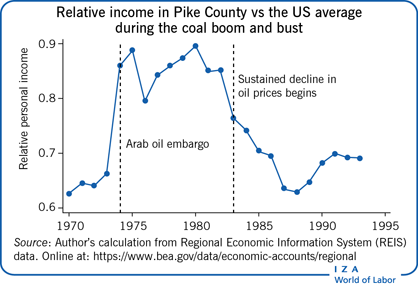Elevator pitch
In the context of growing worldwide inequality, it is important to know what happens when the demand for low-skilled workers changes. Because natural resource shocks are global in nature, but have highly localized impacts on labor prospects in resource extraction areas, they offer a unique opportunity to evaluate low-skilled men's behavior when faced with extreme variations in local labor market conditions. This situation can be utilized to evaluate a broad range of outcomes, from education and income, to marital and fertility status, to voting behavior.

Key findings
Pros
Changes in the market for natural resources produce large shocks that have highly localized labor impacts, creating ideal experimental research conditions.
Changes in natural resource prices are most likely unrelated to local issues, which allows for the identification of causal impacts.
Natural resource shocks provide more precise variation than many other types of instruments because the exact source of the expansion (or contraction) can be identified and the shocks are much larger in magnitude.
Cons
Resource shocks may induce so-called “Dutch disease,” in which natural resources retard (or accelerate) development in other sectors within the economy.
Natural resource extraction work is heavily concentrated among low-skilled men, presenting a unique set of challenges.
The presence of natural resources may generate long-term distortions in local labor markets, which may compromise the external validity of the experiment.
While important, the study of natural resource shocks does little to identify policies that facilitate the re-employment of low-skilled workers.